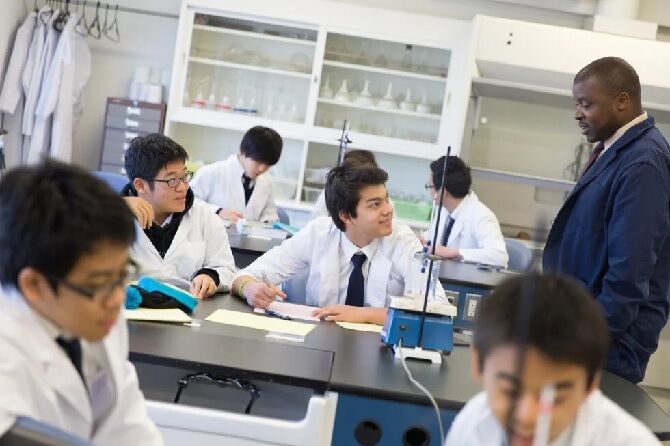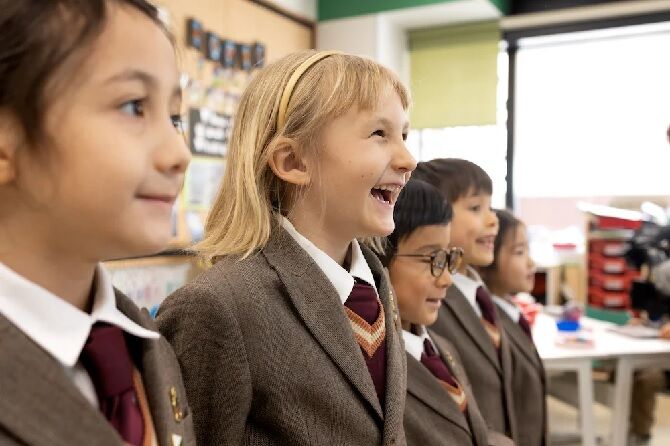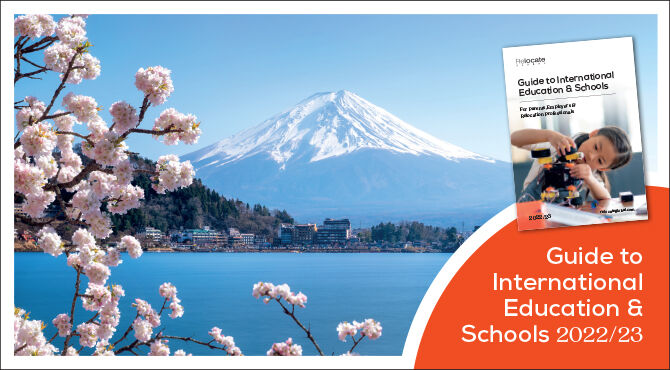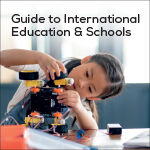Education in Japan
Accession of the United Kingdom of Great Britain and Northern Ireland to the Comprehensive and Progressive Trans-Pacific Partnership (CPTPP), a free trade agreement of 11 members including Japan, Plus the pandemic and disruption to supply chains have highlighted the country as an assignment destination.
International Schools
Most of Japan’s 80-plus international schools are based in Tokyo although there are others in larger cities such as Yokohama and Kobe. According to ISC Research there are at least 50 international schools in Tokyo delivering a range of curriculums with American and British being the most popular and many schools providing the IB. There is a good choice of schools, including faith, single sex and bilingual, and a wide range of curriculums for a range of budgets.“Tokyo is becoming a really attractive destination educationally for international families,” says the International School Advisory’s Jack. “The Japanese government has become open to the presence of international schools and what they can bring to Japan, and the country is starting to become an alternative to China.”International schools are also increasingly popular with Japanese families, particularly those who are globally minded or bicultural. They are more holistic and less pressurised than public schools, something of growing importance to locals. St. Mary International School TokyoAnother notable institution is the International School of the Sacred Heart, an all-girls Catholic school located in Hiroo, Tokyo. With origins dating back to 1908, the school provides bilingual education in English and Japanese to students from preschool through high school. The American School in Japan (ASIJ), founded in 1902, is an international school situated in Tokyo. ASIJ provides education from pre-kindergarten to twelfth grade, following an American-style curriculum that includes Advanced Placement courses and the International Baccalaureate diploma programme.Seisen International School, founded in the late 1940s, is a Catholic all-girls school. The school offers an international education with an emphasis on critical thinking, creativity and problem-solving skills.Additionally, there are several well-established schools in the region:The British School in Tokyo, founded in the late 1980s, provides a British-style education from preschool to high school. Located in central Tokyo, it adheres to the National Curriculum of England and Wales, offering GCSE, A-level, and the International Baccalaureate (IB) programme. Tsukuba International School (TIS), established in the early 1990s in Tsukuba City, a renowned international and science city near Tokyo, is a private, non-profit educational institution. TIS offers an international curriculum from pre-kindergarten to grade 12, focusing on English language proficiency, cultural understanding, and critical thinking skills. In the Kobe region, a residential location is also suitable for those working in Osaka, the longest standing schools include the Canadian Academy. This is a prestigious international school and it follows the International Baccalaureate (IB) curriculum, emphasising critical thinking, communication, and global citizenship. With a diverse student body representing various nationalities, the Canadian Academy fosters a supportive and inclusive learning environment. Marist Brothers International School is a co-educational Catholic school offering education from kindergarten to grade 12.The School focuses on developing critical thinking, creativity, and leadership skills. With a diverse student body representing numerous nationalities, Marist Brothers School provides a supportive and inclusive learning environment.
St. Mary International School TokyoAnother notable institution is the International School of the Sacred Heart, an all-girls Catholic school located in Hiroo, Tokyo. With origins dating back to 1908, the school provides bilingual education in English and Japanese to students from preschool through high school. The American School in Japan (ASIJ), founded in 1902, is an international school situated in Tokyo. ASIJ provides education from pre-kindergarten to twelfth grade, following an American-style curriculum that includes Advanced Placement courses and the International Baccalaureate diploma programme.Seisen International School, founded in the late 1940s, is a Catholic all-girls school. The school offers an international education with an emphasis on critical thinking, creativity and problem-solving skills.Additionally, there are several well-established schools in the region:The British School in Tokyo, founded in the late 1980s, provides a British-style education from preschool to high school. Located in central Tokyo, it adheres to the National Curriculum of England and Wales, offering GCSE, A-level, and the International Baccalaureate (IB) programme. Tsukuba International School (TIS), established in the early 1990s in Tsukuba City, a renowned international and science city near Tokyo, is a private, non-profit educational institution. TIS offers an international curriculum from pre-kindergarten to grade 12, focusing on English language proficiency, cultural understanding, and critical thinking skills. In the Kobe region, a residential location is also suitable for those working in Osaka, the longest standing schools include the Canadian Academy. This is a prestigious international school and it follows the International Baccalaureate (IB) curriculum, emphasising critical thinking, communication, and global citizenship. With a diverse student body representing various nationalities, the Canadian Academy fosters a supportive and inclusive learning environment. Marist Brothers International School is a co-educational Catholic school offering education from kindergarten to grade 12.The School focuses on developing critical thinking, creativity, and leadership skills. With a diverse student body representing numerous nationalities, Marist Brothers School provides a supportive and inclusive learning environment.Language and Culture Options
Most offer education in English but there are options for different nationalities including the Lycee Francais International de Tokyo (French); the Deutsche Schule Tokyo Yokohama (German); the India International School in Japan, created in 2004 and about to move to new campus in the Koto area, and the Tokyo Chinese School which follows the curriculum of the Republic of China.There has also been a surge in demand for Tokyo’s international schools from Chinese nationals: Traditionally Chinese students would have been sent to board in the UK but Japan offers a closer alternative, geographically and culturally.“Chinese expats account for between 40 and 50 per cent of all expats in Tokyo. As the provision of international schools shrinks in China due to regulatory pressure, the demand is being met elsewhere,” says L.E.K’s Sudeep Laad.New Schools
The last few years have seen a mini construction boom in international schools in the city and three offshoots of branded UK private schools have recently opened: Harrow International School Appi Japan in 2022 in the Appi mountains and Rugby School Japan and Malvern College Tokyo both opening in September 2023. The British School in Tokyo will also open a new campus in Tokyo this summer to cope with increased demand.“Existing schools are running at high capacity indicating a favourable outlook for these new schools,” says L.E.K’s Sudeep. “It is also expected more British school brands will turn to the Japanese market to address the high growth in demand.” Phoenix House International SchoolOther new schools include the Hakuba International School, founded by a former Goldman Sachs banker, which will open this summer with a curriculum focused on outdoor learning and sustainability. The boarding school is set amongst nature in the beautiful Hakuba Valley with a focus on the environment and personal well-being.Jinseki International School opened in 2020 in Hiroshima, Japan’s first full boarding primary school with bilingual learning in English and Japanese and the Capital Tokyo International School opened last year with a focus on bilingual education. Students are mainly taught in English with some lessons in Japanese and weekly Mandarin Chinese lessons.Despite the many advantages of living in Japan, there are certain challenges that expats may face. One such challenge is the difficulty of learning the local language, making it challenging to navigate daily life without proficiency in Japanese. Additionally, utilizing online administrative services and conducting cashless transactions can pose obstacles and disrupt the smooth functioning of daily activities.However, for those who are able to overcome these challenges, Japan continues to be a safe, comfortable and stimulating destination for relocation and raising a family.
Phoenix House International SchoolOther new schools include the Hakuba International School, founded by a former Goldman Sachs banker, which will open this summer with a curriculum focused on outdoor learning and sustainability. The boarding school is set amongst nature in the beautiful Hakuba Valley with a focus on the environment and personal well-being.Jinseki International School opened in 2020 in Hiroshima, Japan’s first full boarding primary school with bilingual learning in English and Japanese and the Capital Tokyo International School opened last year with a focus on bilingual education. Students are mainly taught in English with some lessons in Japanese and weekly Mandarin Chinese lessons.Despite the many advantages of living in Japan, there are certain challenges that expats may face. One such challenge is the difficulty of learning the local language, making it challenging to navigate daily life without proficiency in Japanese. Additionally, utilizing online administrative services and conducting cashless transactions can pose obstacles and disrupt the smooth functioning of daily activities.However, for those who are able to overcome these challenges, Japan continues to be a safe, comfortable and stimulating destination for relocation and raising a family.This article is from Relocate Global's Guide to International Education & Schools 2022/23 which is packed with expert tips and information for those relocating and the professionals supporting them.Access hundreds of global services and suppliers in our Online Directory
 For more education and school-related news, visit our Education and Schools pages.
For more education and school-related news, visit our Education and Schools pages.©2026 Re:locate magazine, published by Profile Locations, Spray Hill, Hastings Road, Lamberhurst, Kent TN3 8JB. All rights reserved. This publication (or any part thereof) may not be reproduced in any form without the prior written permission of Profile Locations. Profile Locations accepts no liability for the accuracy of the contents or any opinions expressed herein.
































